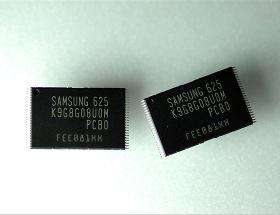Samsung Produces 60-Nanometer 8-Gigabit NAND Flash Memory

Samsung Electronics today announced that it has begun mass producing an 8-Gigabit (Gb) NAND flash memory device, providing a much larger and more affordable storage density for consumer and mobile applications such as mobile phones, MP3 players and gaming consoles. The high-density MLC (multi-level-cell) memory is being produced with 60-nanometer process technology - the smallest used today.
Samsung's 8Gb NAND flash memory, developed in September 2004, is the fifth consecutive NAND flash memory to follow the New Memory Growth Model of double density growth every 12 months, a pattern conceived by Dr. Chang Gyu Hwang, president and CEO of Samsung Electronics Semiconductor Business.
Mass production of the new 8Gb chip allows Samsung to offer an 8-Gigabyte (GB) solution by vertically stacking two 4GB packages, each package carrying a vertical stack of four 8Gb dies. The 8GB NAND which can store 2000 MP3 files or 225 minutes of DVD-quality video is expected to be available in the third quarter of 2006.
Samsung plans to further utilize its 8-Gb NAND flash memory chip in Samsung's high-density MLC NAND, called moviNAND, to produce a 2GB-level NAND market solution. The recently introduced moviNAND combines NAND flash memory and a NAND controller and can be embedded in mobile handsets to accommodate the high data storage requirements that accompany the increasing number of multimedia features on mobile phones.
The newest technology advancement brings 25 percent higher manufacturing productivity over the previous 70nm design technology. It follows the introduction of 80-nm production process technology for DDR2 DRAM a little more than a year ago (March 2005).
Source: Samsung Electronics





















